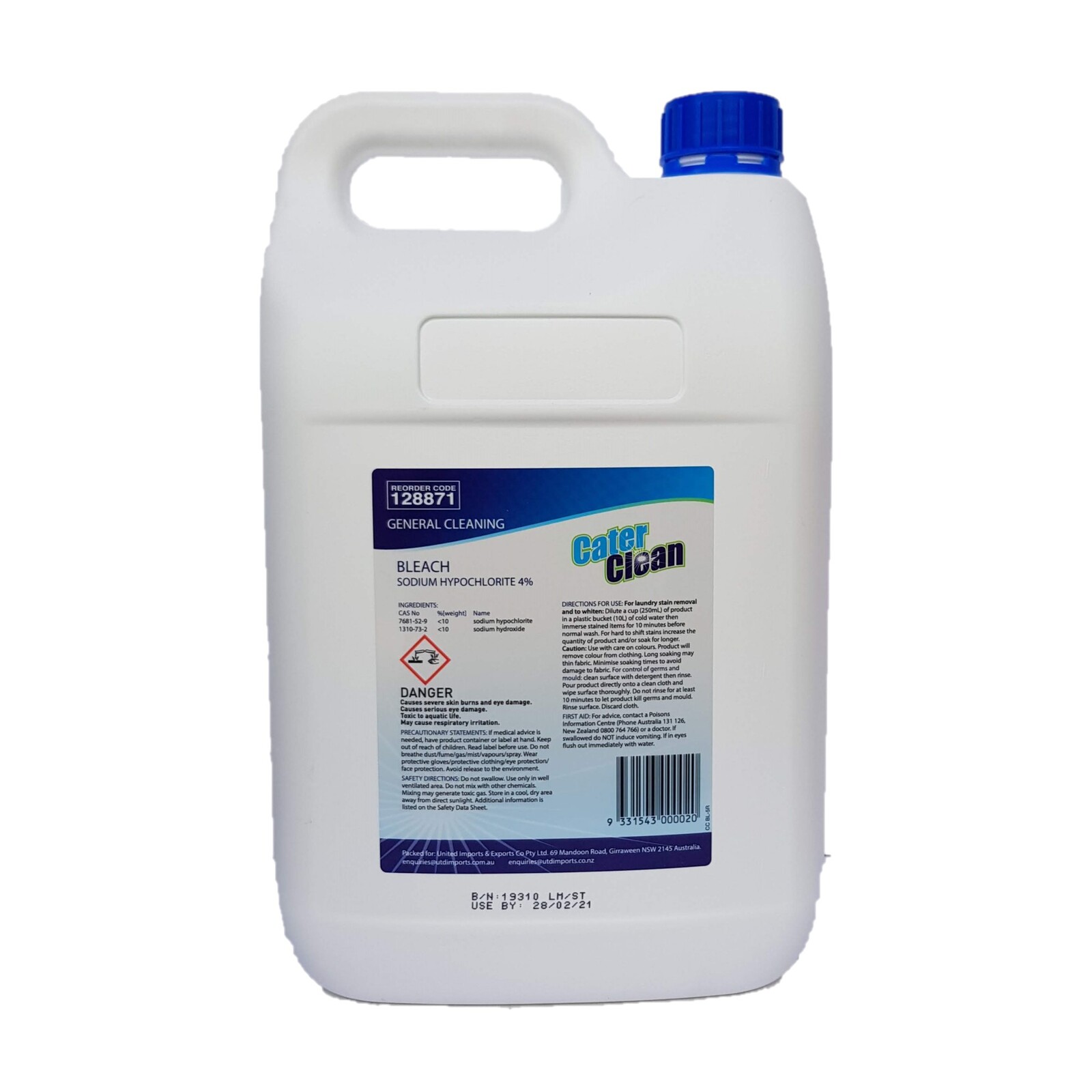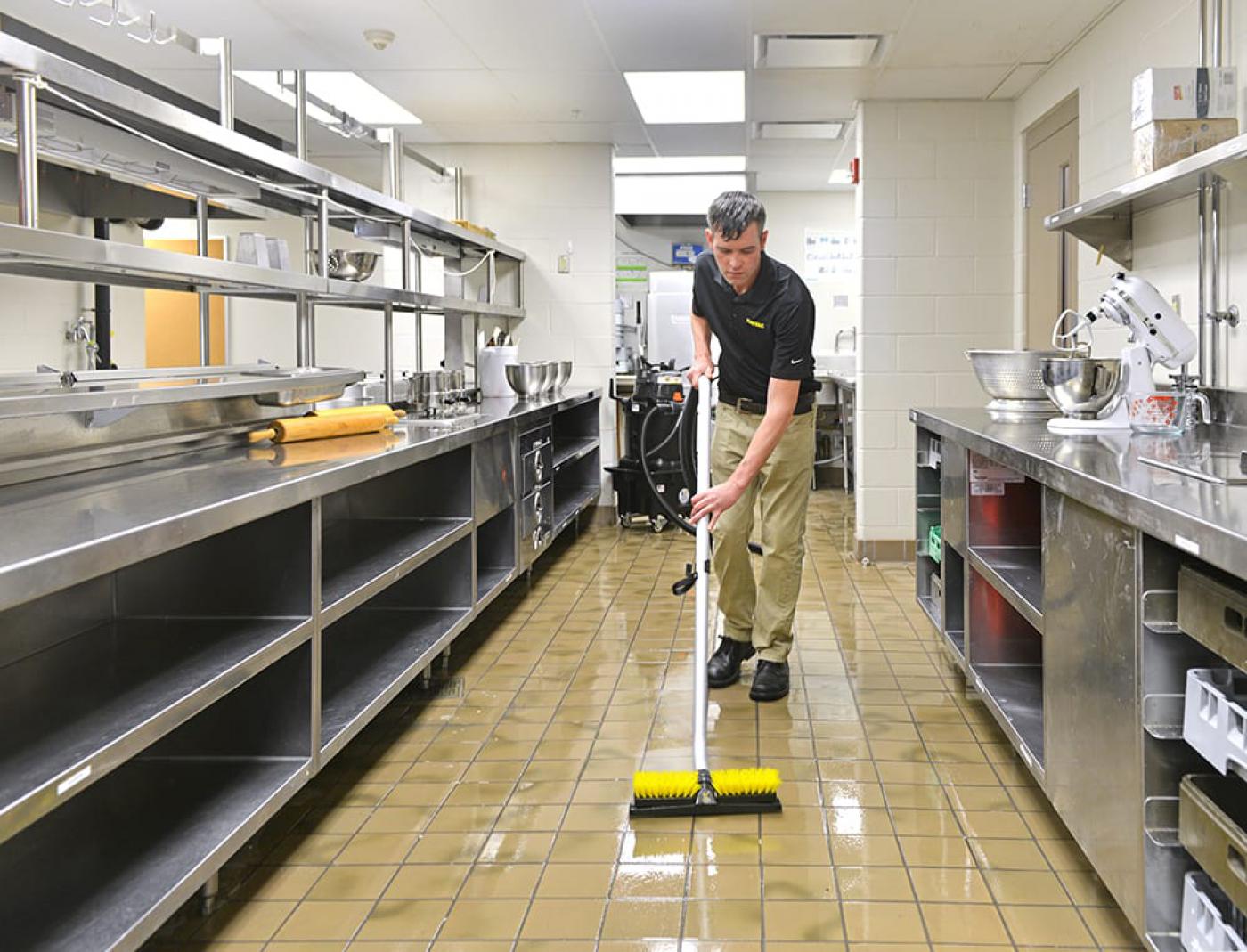14+ Are You Allowed To Use Bleach In A Commercial Kitchen Ideas
Are you allowed to use bleach in a commercial kitchen. The Use of Bleach Bleach is a strong and effective disinfectant. Im just pointing out that we can get a bit alarmist about all this stuff. Its active ingredient sodium hypochlorite denatures protein in micro-organisms and is therefore effective in killing bacteria fungus and viruses. They must also advise employees to avoid mixing chemicals such as ammonia and bleach which create a harmful gas and provide correct labeling on chemical containers. Clorox chlorine bleach is a preferred sanitizer in restaurants because at the correct titration it is very safe for food surfaces utensils and service wares. Cleanliness is a vital part of any catering business and never more so than in the kitchen. Use chlorine-based bleach to disinfect the board once it has been diluted. But many people find it indispensable in the kitchen both as a sanitizer to clean up after raw chicken for example and a stain remover. In any commercial kitchen canteen or catering environment grease and dirt naturally build up over time covering surfaces and cooking equipment. All my previous organisations have banned the use of Bleach but my current company doesnt. There are many different types of food service chemicals you can use to keep your commercial kitchen clean. In my opinion there are much worse things you can do for your health dont get me started on diet sodas than have a container of bleach in your kitchen cleaning arsenal.
Some commercial cleaning agents are also acidic. Chlorine bleach has a bad rap with most eco-minded folk because of its toxicity to humans and to the environment. Keep the premises clear of rubbish food waste dirt and grease. Just keep in mind its I believe a cap full of bleach for every gallon of water. Are you allowed to use bleach in a commercial kitchen Types of Food Service Chemicals. Diluted household bleach is thus recommended for the. Clorox is actually packaged for commercial use but large food purveyors also have their own labels generally at lower prices. If you use bleach responsibly and follow the instructions for diluting it bleach does not pose a health hazard. Sanitizers are used to reduce microorganisms from inanimate environments to safe levels determined by public health codes and regulations. Bleach is fine as long as its properly diluted and properly rinsed off and allowed to air dry. Sanitise using bleach a commercial food-safe sanitiser or a dishwasher on longest hottest cycle. We used bleach in the bakery for our rags and as our sani sink. Only by following commercial kitchen cleaning procedures can you maintain the highest level of hygiene.
 Bulk Lot Bleach 5 Litre Commercial Grade Australian Made Kitchens Bathrooms
Bulk Lot Bleach 5 Litre Commercial Grade Australian Made Kitchens Bathrooms
Are you allowed to use bleach in a commercial kitchen Before talking more about things you should know and where to use sanitizers and disinfectants in a commercial restaurant its important to understand what sanitizers and disinfectants are.

Are you allowed to use bleach in a commercial kitchen. Use a teaspoon to every two pints of water for a suitable dilution. Spread the solution over the board and allow it to rest on the surface for a few minutes. An easy homemade version is to make a solution of 1 tablespoon of liquid chlorine bleach per gallon of water or you can use a commercial sanitizer or sanitizing wipe.
Many different sanitizers can be used. Teams have their own budgets to buy whatever chemicals they need as long as they have a COSHH assessment for them and I see quite a bit of Bleach around especially in Schools. There is no law in place which bans the use of bleach as a cleaning product in any type of UK working environment however many companies have taken it upon themselves to ban its use in their premises since Health Safety inspectors have advised against its use in certain cases specifically in catering environments.
Keep food contact surfaces like benches utensils and containers clean and sanitary. It is highly recommended to use a particular board for raw meat. Of course thats after a natural disaster and Im not actually trying to argue you should drink bleach.
You should research the actual process and the chemistry related to both the creation and the breakdown of bleach before you post things that scare people. This step will kill any remaining bacteria. Wipe from top to bottom with hot water and neutral detergent.
In addition to sanitizing food contact surfaces chlorine bleach. Allowed to drain adequately before contact with food. Use of chlorine bleach for sanitizing raw fruits and vegetables.
Clean before you sanitise. Like Liked by 1 person. If the wall is greasy use a degreaser.
If its tiled use hot water and bleach to kill bacteria in the grout. Pay attention to fingerprints sauce splashes and waste splatters. Bleach was sloshed about like there is no tomorrow in certain quarters but after a long process of educating people about bleach what is does and importantly what it doesnt do ie it is NOT a cleaner but in fact actually breaks down and becomes effectively useless in contact with organic matter things improved to the extent that bleach is no longer necessary.
The chemistry of hypochlorite and water mixtures described. Some chemicals focus on cleaning the visible dirt from kitchen surfaces while others are specifically designed to sanitize the surface and eliminate microscopic germs. Proper ventilation and cleanings stations must be provided to workers who use such chemicals.
Household bleach works quickly and is widely available at a low cost. Sanitizing is the second but equally important step to removing bacteria from your kitchen.
Are you allowed to use bleach in a commercial kitchen Sanitizing is the second but equally important step to removing bacteria from your kitchen.
Are you allowed to use bleach in a commercial kitchen. Household bleach works quickly and is widely available at a low cost. Proper ventilation and cleanings stations must be provided to workers who use such chemicals. Some chemicals focus on cleaning the visible dirt from kitchen surfaces while others are specifically designed to sanitize the surface and eliminate microscopic germs. The chemistry of hypochlorite and water mixtures described. Bleach was sloshed about like there is no tomorrow in certain quarters but after a long process of educating people about bleach what is does and importantly what it doesnt do ie it is NOT a cleaner but in fact actually breaks down and becomes effectively useless in contact with organic matter things improved to the extent that bleach is no longer necessary. Pay attention to fingerprints sauce splashes and waste splatters. If its tiled use hot water and bleach to kill bacteria in the grout. If the wall is greasy use a degreaser. Like Liked by 1 person. Clean before you sanitise. Use of chlorine bleach for sanitizing raw fruits and vegetables.
Allowed to drain adequately before contact with food. In addition to sanitizing food contact surfaces chlorine bleach. Are you allowed to use bleach in a commercial kitchen Wipe from top to bottom with hot water and neutral detergent. This step will kill any remaining bacteria. You should research the actual process and the chemistry related to both the creation and the breakdown of bleach before you post things that scare people. Of course thats after a natural disaster and Im not actually trying to argue you should drink bleach. It is highly recommended to use a particular board for raw meat. Keep food contact surfaces like benches utensils and containers clean and sanitary. There is no law in place which bans the use of bleach as a cleaning product in any type of UK working environment however many companies have taken it upon themselves to ban its use in their premises since Health Safety inspectors have advised against its use in certain cases specifically in catering environments. Teams have their own budgets to buy whatever chemicals they need as long as they have a COSHH assessment for them and I see quite a bit of Bleach around especially in Schools. Many different sanitizers can be used.
 Cleaning With Bleach 6 Reasons Why You Should Be Cautious
Cleaning With Bleach 6 Reasons Why You Should Be Cautious
An easy homemade version is to make a solution of 1 tablespoon of liquid chlorine bleach per gallon of water or you can use a commercial sanitizer or sanitizing wipe. Spread the solution over the board and allow it to rest on the surface for a few minutes. Use a teaspoon to every two pints of water for a suitable dilution. Are you allowed to use bleach in a commercial kitchen.